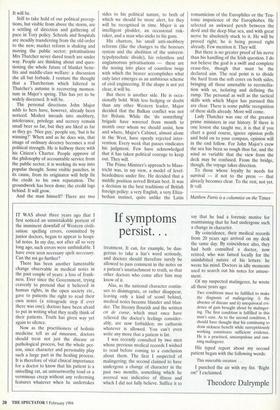If symptoms persist.. .
IT WAS about three years ago that I first noticed an unmistakable portent of the imminent downfall of Western civili- sation: spelling errors, committed by junior doctors, began to appear in hospi- tal notes. In my day, not after all so very long ago, such errors were unthinkable. I have even seen necessary spelt neccesaly. Can the rot go further?
There has been another lamentable change observable in medical notes in the past couple of years: a loss of frank- ness. Ever since the Government, trying cravenly to pretend that it believed in human rights, in the open society etc., gave to patients the right to read their own notes (a retrograde step if ever there was one), doctors have been afraid to put in writing what they really think of their patients. Truth has given way yet again to silence.
Now as the practitioners of holistic medicine tell us ad nauseam, doctors should treat not just the disease or pathological process, but the whole per- son, since character and personality play such a large part in the healing process. It is therefore of vital clinical importance for a doctor to know that his patient is a snivelling rat, an untrustworthy toad or a verminous creep without any redeeming features whatever when he undertakes treatment. It can, for example, be dan- gerous to take a liar's word seriously, and doctors should therefore surely be allowed to pass comment in the notes on a patient's unattachment to truth, so that other doctors who come after him may know of it.
Alas, as the national character contin- ues to disintegrate, or rather disappear, leaving only a kind of scowl behind, medical notes become blander and blan- der. The literary flourish and the written cri de coeur, which must once have relieved the doctor's feelings consider- ably, are now forbidden; no catharsis whatever is allowed. You can't even write any more that a patient is fat.
I was recently consulted by two men whose previous medical records I wished to read before coming to a conclusion about them. The first I suspected of malingering; the second claimed to have undergone a change of character in the past two months, something which he averred was indicative of illness and which I did not fully believe. Suffice it to say that he had a forensic motive for maintaining that he had undergone such a change in character.
By coincidence, their medical records from 20 years ago arrived on my desk the same day. By coincidence also, they had both consulted a doctor, now retired, who was famed locally for the uninhibited nature of his letters: he wrote his mind. Doctors in idle moments used to search out his notes for amuse- ment.
Of my suspected malingerer, he wrote all those years ago:
Two conditions must be fulfilled to make the diagnosis of malingering: i) the absence of disease and ii) unequivocal evi- dence of gain brought about by malinger- ing. The first condition is fulfilled in this man's case. As to the second condition, I should have thought that his continuing to draw sickness benefit while surreptitiously working constitutes sufficient evidence. He is a practised, unscrupulous and cun- ning malingerer.
His typed report about my second patient began with the following words:
This miserable creature .. .
I punched the air with my fist. 'Right on!' I exclaimed.
Theodore Dalrymple


















































 Previous page
Previous page